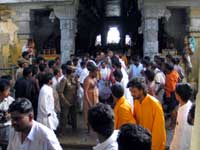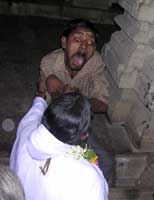16 January 2004 – Rameshwaram
It happened totally unexpectedly. Darshan had only ended a few minutes earlier at 9 in the morning and Amma’s caravan had just left the site of Rameshwaram’s Amritakuteeram site, adjacent to the darshan hall, only minutes later. Some of us chose to walk back to our accommodations, and a lucky choice this turned out to be, because soon there was a complete traffic jam as Amma’s caravan briefly stopped to visit a house on the way. And then the news came: Amma is going to visit the Temple!

The Rameshwaram Temple is one of the major pilgrimage sites in South India. It is the place where Lord Rama began to build a bridge across the sea to rescue his wife Sita from her abductor, Ravana, the demon king of Lanka. It is also the place where Rama worshipped Lord Shiva to absolve himself from the sin of killing Ravana, who, though a demon was also a Brahmin. It houses one of the twelve Jyotirlingams of India. Lingams are the symbol of Lord Shiva and these sacred twelve are believed to emit light (‘jyoti’ means light). For as long as time can tell pilgrims have brought water from the Holy Ganges in Varanasi to pour here off the coast of Rameshwaram in the Bay of Bengal, just as pilgrims take water from the beach of Rameshwaram to Varanasi, symbolizing the unity of India and the One-Divinity-in-All philosophy of Sanatana Dharma.
Amma’s car drove around the 1 sq. km temple complex towards the front gate. There She was welcomed with Purnakumbham by one of the temple’s chief priests and the executive officer who garlanded Her and escorted Her in. Immediately, hundreds of people came from all directions: those lucky devotees of Amma who had heard about the visit, but also many Swami Ayyappa devotees who came for the bathing ceremonies in the temple’s 22 wells. Waiting in the long queue for the darshan of the Lord of Rameshwaram, many left their spot in line, choosing to have Amma’s darshan first.
Amma passed through the main gate, passing the huge ancient corridors with the 1,212 columns that surround the temple. It was built in the year 1717 and it took 30 years to complete the structure. On Her way to the sanctum sanctorum, Amma first made Her way to a small shrine to Ganesha. The priest performed arati for the deity and garlanded Amma. As groups of ashramites formed a path for Amma to walk through, She went on to a little temple still deeper within this ancient House of God.

Amma’s amazing presence of mind astounded everyone as She, though unable to have seen anything because She was surrounded by tons of people, suddenly stopped and turned sideways, crossing right through the crowd. There, even though none of us had noticed, was a young spastic man, his body tangled in a cramped position and his tongue hanging out of his mouth. Amma hugged him immediately and kissed him. Here we find Amma as always living Her teachings, as we recollect Her words on how it isn’t enough to piously visit a temple while scorning the beggars at their gates. Amma says that service to the poor and suffering is real service to God.
Then She went on through the narrow passageways to the next shrine. Up and down the steps, Amma was speeding up and everyone seemed to be running to keep pace, trying to be careful of slipping on the floor, which was wet from its famous 22 bathing teerthas. The many temple pujaris were waiting for Amma to arrive at the main shrine that houses the Jyotir lingam, one of the holiest places in all of India. They made sure only five people entered as they closed the gate to give Amma a moment of silence in this wild, streaming mass of people. As they garlanded Amma, performed arati, and offered bilwa leaf and water from the sacred Ganges, Amma closed Her eyes and seemed miles away in samadhi. Then they all reverently queued for Amma’s darshan.
Amma then stepped out and the winding group of people ran after Her through the inner parts of the temple, which consists of small dark alleyways. She next went to Devi’s shrine, where the priest again garlanded Amma after arati and offered kumkum and a Sri Chakra. The Sri Chakra is a sacred tantric symbol of Shakti, and this Sri Chakra of Rameshwaram is brought out for viewing only once a year during the Navaratri Festival. So sacred is this that at no time is anyone allowed to even touch this holy icon. But here, the priests bring this Sri Chakra out especially for Amma. Amma touched it reverently with both hands. The priests then received Amma’s darshan.
Just on the western side of the temple, Amma stopped at the shrine of Lord Nataraja. Here more than 100,000 large rudraksha beads have been strung together to form a temple for Nataraja, Lord Shiva in His act of the Cosmic Dance. This small temple is also the site where the ancient Rishi Patanjali, author of the famous Yoga Sutras, performed austere tapas. Here too Amma was garlanded, and offered some sacred ash. Putting it on Her forehead, Amma gave darshan to the pujari who had tears in his eyes.
It is no small wonder to see the orthodox Brahmins of the Hindu priesthood receiving Amma in such a way. Both caste and gender differences are simply swept away. This is yet another way in which Amma is quietly revolutionizing many aspects of society. As Shri. Padma Kumar, one of the program’s organizers commented, “Amma has changed Rameshwaram.”
On the way out Amma paused before the old female temple elephant, feeding her some bananas. Then, as She stepped out of the temple, the temple authorities honored Amma, adorning Her with a beautiful silk shawl and presenting Her with sacred water of Kotitirtha. Amma touched them and offered a brief silent prayer before walking through the crowd to the caravan, after spending nearly 30 minutes in the temple. She turned around once more to gaze at Her children from inside the caravan, caressing some of the hands that were reaching out to Her. As three large eagles circled above the vehicle, Amma closed the door, leaving all with a feeling of miracle and utter joy.
– Devadath & Dass
